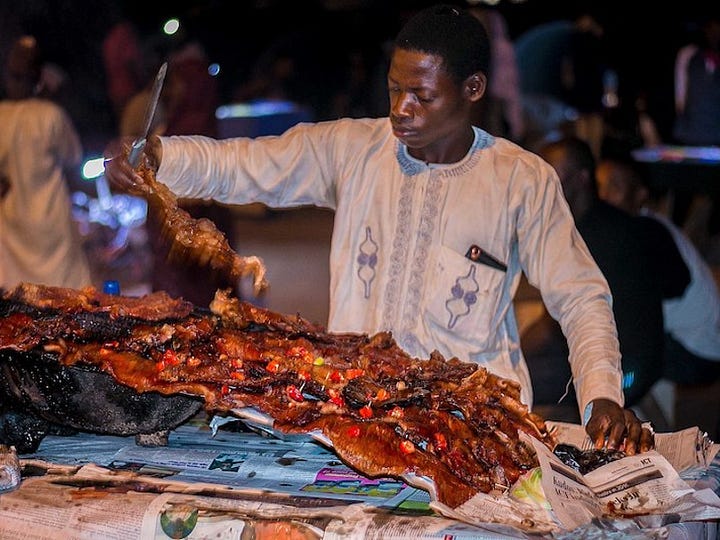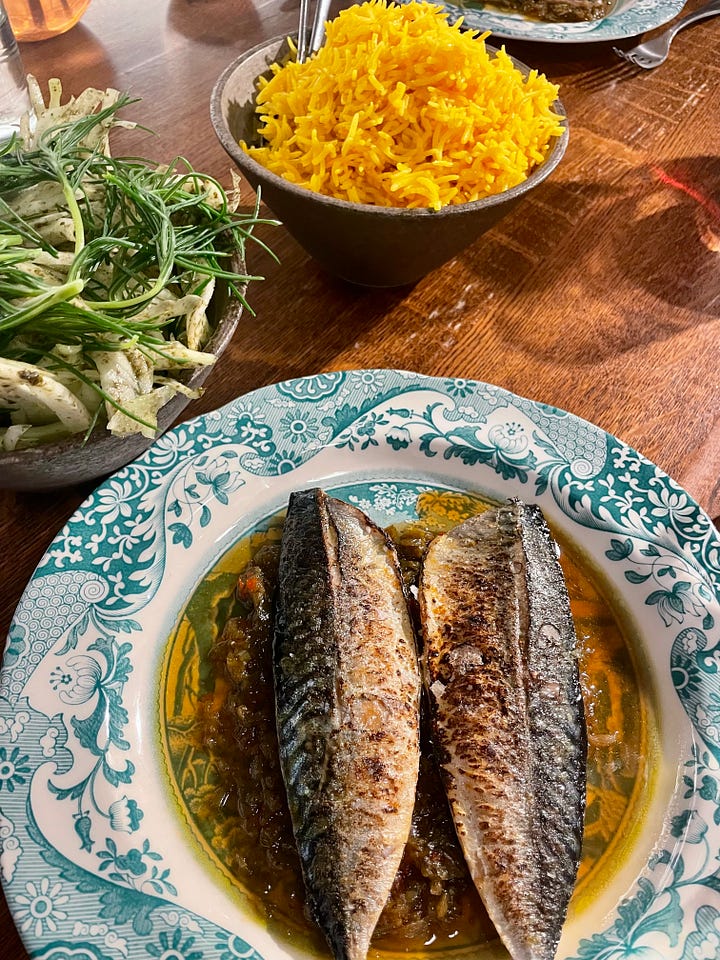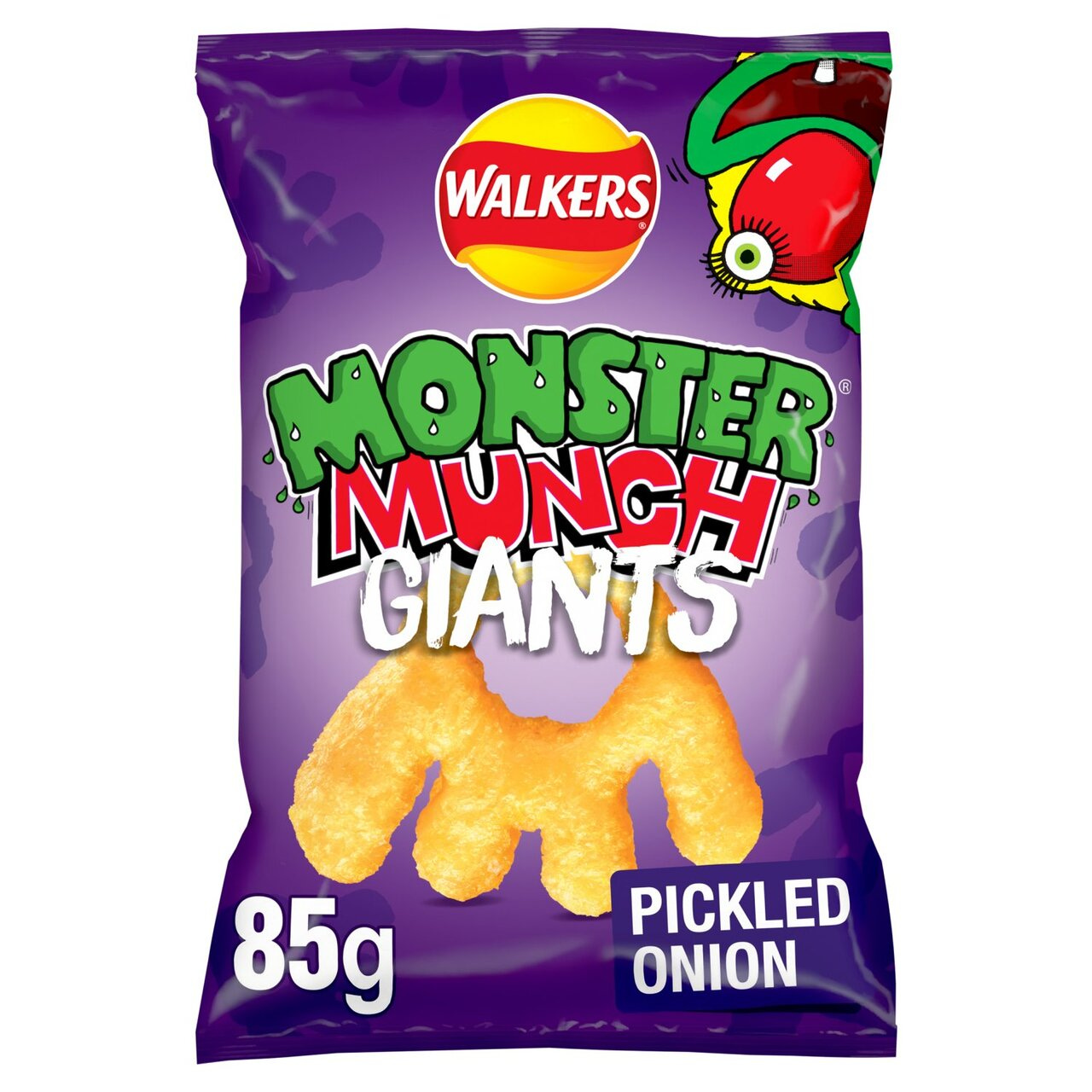Monster Munch memories
Jimi Famurewa’s new memoir is a fascinating exploration of immigrant dual identity - and the power of food memories. Plus: what I've been drinking this week




Early in restaurant critic Jimi Famurewa’s memoir, Picky: From Fussy Child to Professional Gourmet, he admits that he found many of his family’s traditional Nigerian dishes a bit much. Not only were the flavours intense for a fussy eater raised in London, but he associated them with his Lagos relatives: “pounded yam was a kettle-bellied uncle on the sofa, nudging me with a bare foot when it was time to grab him another bottle of stout. Egusi soup, clogged with indeterminate animal parts, was my grandmother noisily sucking the marrow from crunched chicken bones.” It’s just one example of the theme of dual identity flowing through this autobiography, as Famurewa negotiates the cultural territory of his Nigerian heritage and its junction with the British, suburban one of his birth.
Famurewa’s first book, Settlers (2022), was a serious slice of social history, exploring the origins and the food culture of black African London. Picky is far more personal – and more richly evocative for it. The smells and colours of ayamase stew, puff-puff doughnuts and jollof rice leap from its pages, alongside those of his lifelong passion for American fast food. Here as in Settlers, he is also endlessly inquiring about his bifurcated identity. Thus on the appeal of the US chains: “I think there was something about this attainable, inexpensive display of order and abundance that spoke particularly to migrant families who were familiar with atmospheres of scarcity and chaos. The cookie-cutter glow of a McDonald’s or a Wimpy or a KFC or a Burger King symbolised an ease and a welcome we wouldn’t necessarily find in, say, a pub or caff.”
Picky is profoundly concerned with the relationship between food and memory. At a dinner last week at Fortnum & Mason’s to mark the book’s publication, dishes included mackerel with ayamase sauce, albeit toned down for English palates (pictured above); the Nigerian “mother sauce” of tomatoes and red peppers, served with bread; and crudités with pickled-onion-flavoured dip, a nod to Jimi’s childhood dedication to pickled-onion Monster Munch snacks.
He engagingly explores the associations of these flavours. But at some point in Famurewa’s life, there’s a transition from memories conjured by taste and more nuanced moments summoned by the memory of particular meals. These later dishes assume a different significance. Perhaps this shift stems from the act of cooking rather than just eating. Consider his first kitchen efforts at university, taking inspiration from Jamie Oliver’s classic Naked Chef cookbook: “What better way to forge robust social relationships than with aspirational plates of carbonara and caprese salad and none-more-noughties chicken breasts wrapped in Parma ham?” And the first meal he cooks for a new girlfriend, now his wife, is from-scratch fish and chips: she marvels, “Who is this guy?”
And in this way, tracing key life moments through food, Picky made me think autobiographically too. My memories likewise follow the flavours-versus-meals shift. The taste of a favourite childhood dessert (butterscotch Angel Delight) would be evocative but not a fleshed-out memory, like the time in my gap year when I made pita bread (then almost unknown in the UK; my pitas didn’t really work, though my girlfriend gamely made sandwiches from the slightly more puffed-up ones.)
But inevitably, despite our differences in background and age, I have cultural and professional overlap with Famurewa – indeed actual overlap, since we both worked on the London Evening Standard’s Features desk in 2015 (full disclosure here: Jimi is a friend.) Thus we share the nightmare memory of school dinners, surely a near-universal for generations of British children. Jimi recounts hiding a last ball of mashed potato in his pocket in order to be allowed pudding; I still vividly recall, aged five or six, the cajoling of a dinner lady trying to get me to eat a slice of revolting quiche – a dish I couldn’t face for decades after. Come to think of it, that’s one of my earliest food memories.
Likewise for both of us, America was a deeply formative experience – for Famurewa on a series of summer trips staying with relatives in Florida, Missouri and Michigan, for me while doing a PhD in North Carolina. Famurewa, already a devotee of American fast food, falls in love with the buckets of butter-drenched popcorn and Jolly Rancher candies. I wasn’t keen on most of the fast food but can still almost taste the cream-cheese-and-olive bagels I bought at Bruegger's Bagel Bakery after class (bagels were then unknown in provincial Britain). North Carolina pork barbecue has a similar effect on me.
And while Famurewa is good at contextualising his memories in terms of recent British food history – the “dirty food” craze of the 20-teens heralded by MEATeasy, or “bad 90s pizza” – those phenomena are equally memorable to me for the times and places they conjure up. I spent several weeks in 1986 helping serve staggeringly rubbish microwaved pizza to sunburnt Brummie tourists on a Devon beach. And the dirty food vogue of my later Standard years, despite its greasy limitations, remains redolent to me of a time before Brexit and Covid had started crushing the life out of London.
Famurewa wasn’t entirely happy at the Standard, despite colleagues “who matched caustic intelligence and humour with a scarcely believable speed of output and the unflustered nervelessness of field surgeons.” That was how I found it: while I enjoyed the adrenaline buzz, I too yearned to escape. Every Monday once the first edition was “off stone” (sent to print), I feverishly scanned the Guardian’s media jobs pages over a bacon-and-egg sandwich in the Northcliffe House canteen. My Proustian moment for that time came a few years ago at a hotel breakfast buffet in Wales, as I bit into a brown-sauce-slathered wodge of toast, fried egg and catering bacon. The taste conjured up a memory of hope, of escaping the right-wing paper and my loathsome boss – as well as a relieved awareness of the life I’d built in the intervening period. Intense years sandwiched by sandwiches.
But it's an open question whether, pace Proust, food has this memory-hole power for everyone. Famurewa realises that he might have met his life partner when, aside from other things, he sees that she obsesses about food as much as he does: “food was a vital ingredient in the initial months of the relationship that would come to be maybe the most important in my life.”
Likewise, I can remember exactly what I was cooking the moment I first told my girlfriend/future wife that I loved her (seared tuna: it was the mid 90s.) Zillah, however, cannot ever deal with my breakfast question of, “So what shall we have for dinner tonight?”; it seems she doesn’t have as many food memories as me either. Perhaps not even the ordeal of school dinners is universal: I still remember my incredulity at the time as classmates tucked into the slop that was put in front of us – yelps of “bloody lovely!”
Perhaps other people’s memories have different sensual triggers. Not that, say, sound isn’t evocative for me: the incendiary opening bars of the Clash’s Complete Control, the sound of a dial-up modem connecting (younger readers may have to look those up.) But for me, taste and smell are the key; for Famurewa, maybe even more so. Though I’m quite glad I don’t have any workplace memories to equal this from his first job at lads’ mag Maxim: “If I shut my eyes, I can still smell the odd, perfumed cocoa butter scent of a prosthetic masturbation aid that loitered near my desk for weeks.” After reading this rich and thoughtful memoir, I have resolved to explore Nigerian food more – though for me, the scent of bubbling egusi will sadly never summon up memories like these.
What I’ve been drinking this week
Vignerons de Mancey Crémant de Bourgogne Brut Réserve NV - this sparkler is a blend of Chardonnay and lesser Burgundian white grape Aligoté (actually pretty trendy just now, though personally I still don’t see it). This is very decent for a crémant, quite rich, toasty lees character, creamy and rounded, with just enough balancing acidity. I drank this at my my fellow wine Substacker George Nordahl’s pop-up wine bar at Narrative café on Blackhorse Rd, in the wilds of Walthamstow (Thorne Wines, WineKraft, from £19.50.)
Viña Zorzal “Sea of Dreams” red 2020, Navarra - a collaborative project between this leading Navarra producer and Ben Henshaw, founder of the UK’s best specialist Spanish importer, Indigo. This Garnacha brims with bright, fresh, spicy red fruit (Songbird Wines, The Sourcing Table, The Good Wine Shop, Vino Gusto and elsewhere, from £17.75.)
Freedom Blend 2022 - this unusual red by big Moldovan producer Purcari is made there from a blend of grapes from three countries currently standing up to Russian imperialism: it’s 65 per cent Georgian Saperavi, 20 per cent Moldovan Rara Neagra and 20 per cent Ukrainian Bastardo Magaraciski (not, apparently, a local insult). Warm, rich, sweet fruit and fresh acidity (Vinatis, £21.88.)




